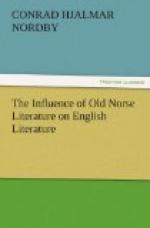For peace I bear unto thee, and
to all the kings of the earth,
Who bear the sword aright, and are crowned with
the crown of worth;
But unpeace to the lords of evil, and the battle
and the death;
And the edge of the sword to the traitor, and
the flame to the
slanderous breath:
And I would that the loving were loved, and I
would that the weary
should sleep,
And that man should hearken to man, and that he
that soweth should
reap.
(P. 174.)
Here, by the way, is the burden of Morris’s preaching in the cause of a better society. It recurs a few pages further on in the poem, where the Niblungs bestow praise on this new hero:
And they say, when the sun of summer
shall come aback to the land,
It shall shine on the fields of the tiller that
fears no heavy hand;
That the sleep shall be for the plougher, and
the loaf for him that
sowed,
Through every furrowed acre where the Son of Sigmund
rode.
(P. 178.)
It need hardly be remarked that this Sigurd is not the sagaman’s ideal. The Icelanders never evolved such high conceptions of man’s obligations to man, but in their ignorance they were no worse off than their continental brethren, for these forgot their greatest Teacher’s teaching, and modern social science must point them back to it.
This Sigurd that we love becomes the Sigurd that we pity in the drinking of a draught. Sorrow takes the place of joy in his life, and “the soul is changed in him,” so that men may say that on this day they saw him die the first time, who was to die a second time by Guttorm’s sword. Gloom spreads over all the earth with the quenching of Sigurd’s joy:
In the deedless dark he rideth,
and all things he remembers save one,
And nought else hath he care
to remember of all the deeds he hath done.
Here is illustrated the essential difference between the sagaman’s art and the modern story-teller’s. The Icelander must tell his story in haste; the deeds of men are his care, not their divagations nor their psychologizings. The modern writer must linger on every step in the story until the motive and the meaning are laid bare. In the present-day version Sigurd’s mental sufferings are described at length, and our hearts are wrung at his unmerited woes. The saga knows no such woes, and to all appearance Sigurd’s life is not unhappy to its very end. Indeed, it appears in more than one place in Morris’s poem that Sigurd has become godlike through the hard experiences of his life. Take this passage as an illustration:
So is Sigurd yet with the Niblungs,
and he loveth Gudrun his wife,
And wendeth afield with the brethren to the days
of the dooming of
life;
And nought his glory waneth, nor falleth the flood
of praise:
To every man he hearkeneth, nor gainsayeth any
grace,
And, glad is the poor in the Doom-ring when he
seeth his face mid
the Kings,




